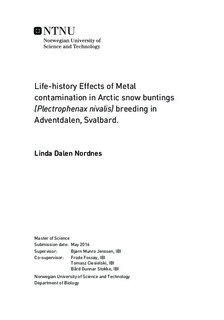Life-history Effects of Metal contamination in Arctic snow buntings (Plectrophenax nivalis) breeding in Adventdalen, Svalbard.
Abstract
The present study was the first to investigate element concentrations in feathers of both nestling and adult snow buntings in the Arctic environment of Adventdalen. Significant differences in concentrations between nestling- and adult feathers were found, but a clear age-dependent accumulation could not be observed among nestlings, 1 year old- and 2 years or older birds. However, external contamination of adult samples could possibly mask internal accumulation. P, K, Na, Mg, Zn, Se, Rb and Hg was present in highest concentrations in nestlings, while the rest of the examined elements were present in highest concentrations in feathers of adults. No significant effect on accumulation was discovered for sex.
As nestlings hatch and develop in Adventdalen, while adults complete their annual molt in the area, feathers of both groups are considered appropriate to assess local pollution. Compared to reference concentrations in other passerine birds, coal-associated elements were mostly present in lower or equal concentrations in feathers of snow buntings from Adventdalen. Al and Co differs from the other elements, as their concentrations for comparison are higher. Hence, element concentrations in feathers of snow buntings from this area, do not reflect emissions associated with coal industry to a large extent. As toxicological implications were not a main focus of this study, the results primarily report a status regarding element concentrations in nestling and adult snow buntings in Adventdalen. However, based on comparison with reference levels in other passerine species, high concentrations of Al in adults and high concentrations of Co, Se and Zn in nestling and adults could give cause for concern.
Follow-up studies using other tissues and/or organs are strongly recommended to verify and further investigate the role of age and sex in accumulation of elements in snow buntings. Such analysis combined with environmental analysis could also provide a better basis for a conclusion regarding environmental exposure, and hence, emissions from the coal power plant located in Longyearbyen. High concentrations of Al in adults, in addition to high concentrations of Co, Se and Zn in nestlings and adults, require further examinations to verify levels and examine if they are of toxicological significance for the birds.
